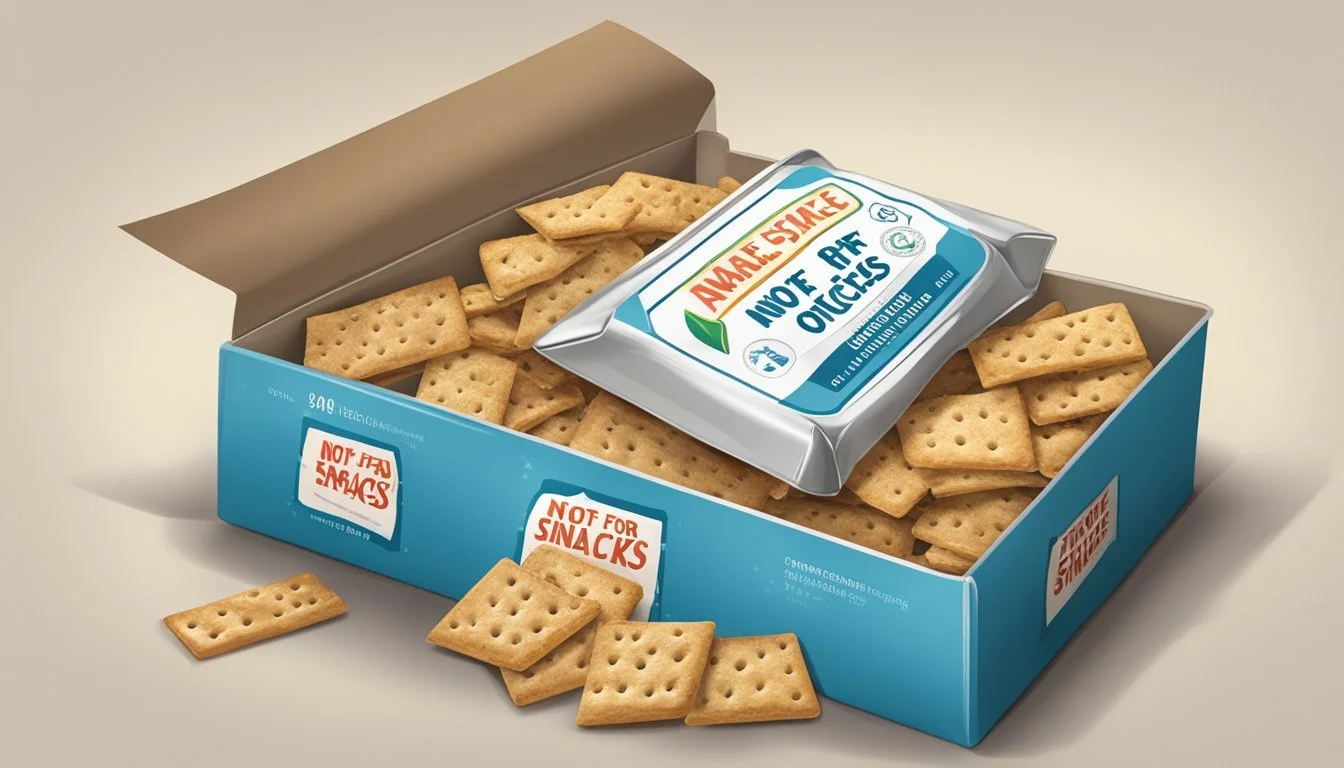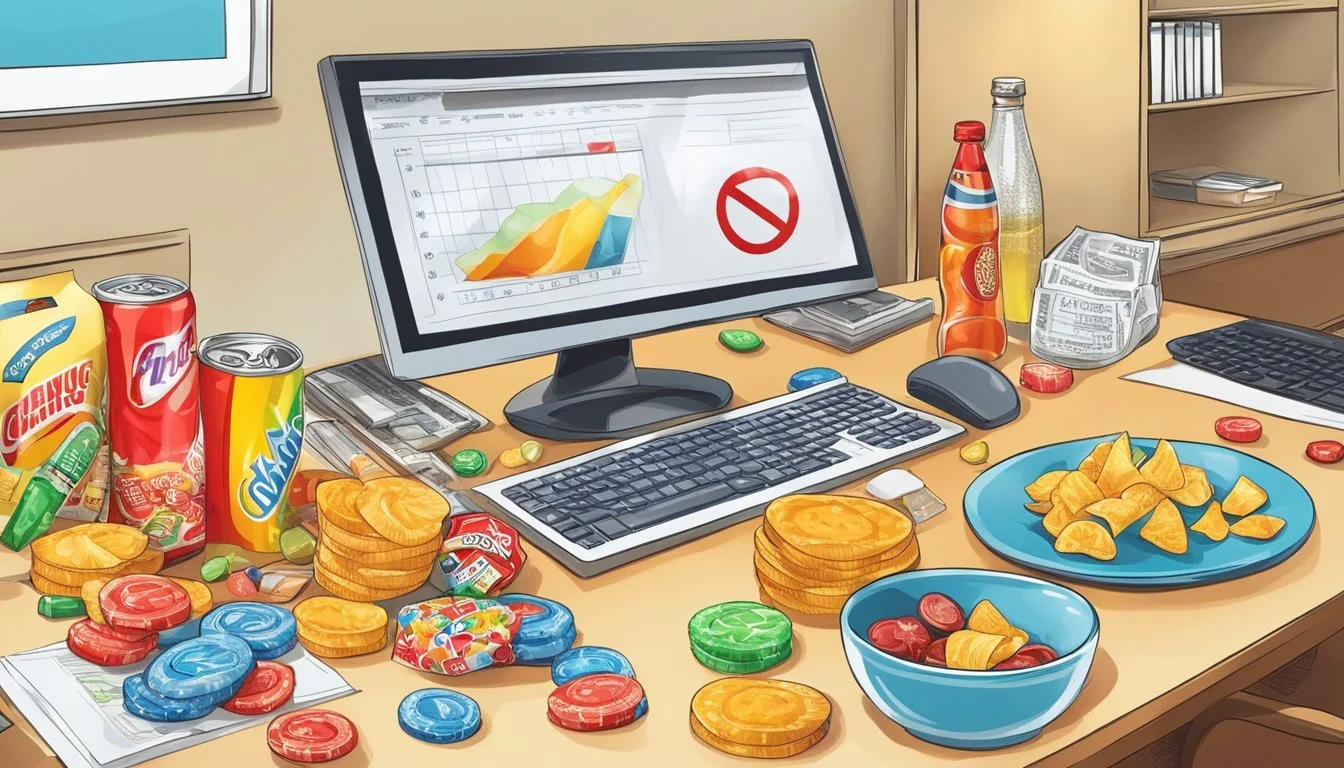10 Not Safe for Office Snacks
Foods to Avoid at Your Desk
Navigating the landscape of office snacks can be more complicated than it seems. What may appear as an innocent bite could easily turn out to be a social faux pas or a source of discomfort for colleagues. Recognizing which snacks are not suitable for the office is essential for maintaining a pleasant and professional environment.
Understanding which snacks to avoid can help prevent unnecessary disruptions and promote a more comfortable workspace. By being mindful of these dietary choices, employees can contribute to a more harmonious and productive office atmosphere.
1) Garlic Anchovy Dip
Garlic Anchovy Dip, also known as Bagna Càuda, originates from Northern Italy. It's a flavorful and aromatic dip combining garlic, anchovies, olive oil, and butter. The pungent smell of garlic and anchovy can linger in the air and on your breath, making it less than ideal for an office setting.
Preparation involves gently simmering garlic in milk or water until it's soft. The garlic is then mashed into a paste and mixed with anchovies. Olive oil and sometimes butter are added to create a rich, smooth consistency.
Workers might find the smell of garlic and anchovies distracting or unpleasant. Despite the rich flavor, Bagna Càuda’s strong aroma makes it a snack best enjoyed outside the office environment.
2) Kimchi
Kimchi is a traditional Korean dish made from fermented vegetables, mainly Napa cabbage and radishes. Due to its strong, pungent aroma, it can be quite disruptive in an office setting.
The fermentation process, which involves brining, seasoning, and storing, gives kimchi its signature tangy flavor and smell. This smell can linger, particularly when kimchi is kept in shared spaces like office refrigerators.
Eating kimchi at your desk may not be ideal. The potent odor can travel and might not be appreciated by all colleagues. Additionally, kimchi can be quite messy, potentially posing a risk to keyboards and documents.
Despite these challenges, kimchi is valued for its health benefits. It is low in calories, rich in fiber, and packed with essential vitamins. For instance, it is an excellent source of vitamin K and folate, crucial for blood clotting and heart health.
However, consuming it in a communal workspace requires consideration of others. A shared appreciation for its rich flavor might be best enjoyed outside of the office environment, where its strong scent won't be an issue.
3) Pickled Herring
Pickled herring might be beloved in many cultures, but it’s not an ideal choice for the office snack drawer.
One major issue is the strong odor that pickled herring emits. The smell can be quite potent and linger in shared spaces, which can be off-putting for colleagues.
Additionally, pickled herring is often high in sodium due to the pickling process. This can be problematic for those with hypertension or cardiovascular disease, potentially making it an unhealthy option for some people.
The fish itself is rich in omega-3 fatty acids, protein, vitamin D, and vitamin B12, which are beneficial nutrients. However, the health benefits do not outweigh the practicality concerns when considering it as an office snack.
Finally, commercial varieties may contain added sugars and preservatives. These additives can detract from the nutritional value and could be a point of concern for those trying to eat clean.
4) Durian Chips
Durian chips, although popular in some regions, are not ideal for the office setting. The pungent aroma can be quite overpowering and may not be appreciated by all of your colleagues.
These chips are made from the durian fruit, known for its strong smell that can linger for hours. While some people may enjoy the taste, others find it off-putting.
The crunchy texture and unique flavor profile of durian chips make them a conversation starter, but not necessarily in a good way. In a shared workspace, it’s important to consider the sensory experience of everyone around you.
Additionally, the smell can permeate the office, lingering on desks and in the air. This can create an unpleasant environment for those who are sensitive to strong odors.
Despite their appeal to durian enthusiasts, these chips are best enjoyed in a more private setting where the smell won't disturb those who are not fans of the fruit.
5) Blue Cheese
Blue cheese, while flavorful, is not the ideal office snack. It has a strong odor that can be off-putting to colleagues. Many people are sensitive to the pungent smell, which can linger in communal areas.
Additionally, blue cheese is high in saturated fats. An ounce of blue cheese contains around 8.14 grams of fat, with 5.3 grams being saturated fat. Saturated fats can contribute to health issues if consumed in large quantities.
Blue cheese also contains high levels of sodium. This can be problematic for those who are trying to manage their blood pressure. For example, Roquefort—a type of blue cheese—contains about 1,670 milligrams of sodium per serving.
The texture of blue cheese can be another concern. Its crumbly nature makes it messy, potentially leading to crumbs and residue on office surfaces. This can create extra work for cleaning staff and might not be appreciated by coworkers.
6) Wasabi Peas
Wasabi peas are popular for their intense flavor and crunchy texture. They provide a quick, fiery snack that many enjoy. Each serving contains nutrients like manganese, thiamin, copper, and vitamin K.
Wasabi peas can be calorie-dense. At 130 calories per ounce, these snacks might not suit those monitoring their caloric intake.
The high sodium content in wasabi peas is another concern. Sodium can affect blood pressure, making it essential to limit intake.
Additionally, wasabi peas often contain added sugars and artificial additives. Checking the ingredients on labels is prudent for those mindful of food additives.
Portion control is crucial with wasabi peas. Eating too many could lead to discomfort. It’s best to enjoy in moderate amounts.
7) Sardine Crackers
Sardine crackers can indeed be a tasty and nutritious snack, but they may not be ideal for the office. Sardines are rich in omega-3 fatty acids, protein, and a variety of vitamins and minerals which contribute to their numerous health benefits.
Despite their nutritional value, sardines have a strong and distinctive smell. This odor can linger in shared office spaces, potentially bothering colleagues. The aroma of sardines can be difficult to mask and may persist even after disposal.
The process of assembling sardine crackers can also be messy. Spreading condiments and stacking sardines on crackers requires some preparation and can leave residue on desks or communal kitchen surfaces. This can create an unsanitary environment if not cleaned up immediately.
Consuming Sardine crackers in the office might not be the best way to maintain a harmonious work environment. Office-friendly snacks should ideally minimize odors and mess to ensure a pleasant experience for everyone sharing the space.
8) Spicy Mustard Pretzels
Spicy mustard pretzels can be a flavorful treat, but they’re not always ideal for the office.
Their strong aroma from mustard and spices can be too intense for a shared space. This scent can linger, often causing discomfort to colleagues who might be sensitive to strong smells.
Office settings generally require less disruptive snacks that won't draw attention. The noise from crunching pretzels can also be distracting during work hours or meetings.
Moreover, indulging in spicy mustard pretzels can leave your fingers greasy or coated with seasoning. This can be bothersome when handling paperwork or using keyboards and other office equipment.
Consideration for coworkers’ preferences and sensitivities is crucial when selecting office snacks. Keeping the workplace clean and maintaining a neutral scent environment helps everyone stay focused and comfortable.
9) Pork Rinds
Pork rinds might seem like a tempting snack due to their crunchy texture and savory flavor. They are deep-fried pork skins, commonly enjoyed in various flavors and forms. Each serving packs a high amount of protein, around 9 grams per serving, making them appear beneficial at first glance.
Despite being low in carbohydrates, pork rinds are loaded with fat and sodium. A single serving can contain up to 10 grams of fat, including unhealthy saturated and trans fats that aren't good for heart health. Additionally, pork rinds can have up to 500 milligrams of sodium, which is over 20% of the recommended daily intake.
These snacks offer little in terms of vitamins and minerals. They lack essential nutrients like fiber, which is crucial for digestive health. Their high calorie and unhealthy fat content can contribute to undesirable weight gain and other health issues if consumed frequently.
Casually munching on pork rinds at the office can derail any attempts at maintaining a balanced diet. The convenience and taste often disguise their unhealthy attributes, making them a risky choice for a workplace snack drawer.
10) Fried Squid Snacks
Fried squid snacks, such as Ika Fry, are a popular culinary choice in Japan. There are a few variations available, including Ika Ring and Ika Ball. Ika Ring is made from deep-fried squid body slices, whereas Ika Ball consists of deep-fried minced squid formed into meatballs.
The batter or coating for Ika Fry generally comes in two main styles. One uses panko breadcrumbs, similar to the preparation of Japanese Katsu. The other style, known as Karaage, involves coating the squid in flour or starch without breadcrumbs.
While undoubtedly flavorful, fried squid snacks have a strong aroma. The fried preparation method can result in an intense smell that may not be suitable for shared office spaces. This strong smell can linger, particularly if reheated in an office microwave.
Moreover, the oiliness of fried squid snacks may also pose a problem in a professional environment. Handling these snacks could lead to greasy fingers, which is not ideal for those working with keyboards, touch screens, or paper documents.
Therefore, despite their deliciousness, fried squid snacks are best enjoyed outside of the workspace.
Health Risks of Unhealthy Office Snacks
Unhealthy office snacks can pose significant health risks, including negative effects on blood sugar levels, increased risk of obesity, and digestive issues. Understanding these risks can help individuals make better snack choices at work.
Impact on Blood Sugar Levels
Consuming snacks high in refined sugars and simple carbohydrates can lead to rapid spikes in blood sugar levels. Popular office snacks like doughnuts, Pop-Tarts, and certain granola bars contain these ingredients.
Frequent blood sugar spikes followed by sharp drops can cause energy crashes, making it hard to concentrate. Long-term, these fluctuations increase the risk of developing insulin resistance, a precursor to type 2 diabetes.
Increased Risk of Obesity
Many office snacks are calorie-dense and nutrient-poor. Items like potato chips and pastries are high in unhealthy fats and sugars. These types of snacks can lead to caloric overconsumption, as they often lack fiber and protein that promote satiety.
Eating such snacks regularly contributes to weight gain. Obesity is associated with multiple serious health conditions, including cardiovascular disease, hypertension, and certain cancers.
Digestive Issues
Some unhealthy office snacks contain artificial additives and preservatives, which can cause digestive discomfort. Processed snacks often lack dietary fiber, leading to constipation and irregular bowel movements.
Additionally, consuming snacks high in fat and sugar can disrupt gut flora balance. This imbalance may result in bloating, gas, and overall digestive unease.
Alternatives to Unhealthy Office Snacks
Healthy snacking at the office can boost productivity and keep energy levels stable. Here are some nutrient-rich options and easy-to-prepare snacks that make great alternatives to unhealthy choices.
Nutrient-Rich Options
Mixed Nuts: A blend of almonds, walnuts, and cashews offers healthy fats, protein, and fiber. They help keep energy levels consistent without the sugar crash that comes from eating candy or cookies.
Fresh Fruits: Apples, berries, and oranges are rich in vitamins and antioxidants. They are naturally sweet, making them a satisfying replacement for sugary treats.
Greek Yogurt: High in protein and probiotics, Greek yogurt supports digestive health and keeps one feeling full longer. Adding some honey or fresh berries enhances its nutritional value.
Hummus and Veggies: A serving of hummus with carrot sticks, celery, or bell peppers provides fiber, healthy fats, and plenty of vitamins. This combination is both tasty and filling.
Easy-to-Prepare Snacks
Trail Mix: Combine mixed nuts, dried fruits like dates and cranberries, and a tablespoon of chia seeds. This snack is quick to assemble, rich in fiber, and packed with energy-boosting nutrients.
Rice Cakes with Avocado: Spread mashed avocado on top of rice cakes. Sprinkle with some chia or flax seeds for added omega-3 fatty acids. This snack is simple, delicious, and full of healthy fats.
Overnight Oats: Prepare by mixing oats, almond milk, chia seeds, and a touch of honey in a jar. Refrigerate overnight, and in the morning, top with some fresh fruits or nuts. It’s an ideal option for a quick, nutritious snack.
Cheese and Whole Grain Crackers: A couple of slices of cheese with whole grain crackers make for a balanced snack. The combination provides protein, fiber, and important minerals like calcium.
Adopting these alternatives not only helps in maintaining a healthy lifestyle but also ensures you stay fueled and focused throughout the workday.
Creating a Healthier Office Environment
A healthier office environment can be achieved by encouraging healthy snack choices and providing educational resources to employees.
Encouraging Healthy Choices
Encouraging healthy choices begins with providing a variety of nutritious snack options. Stock the office pantry with fresh fruits, vegetables, and nuts. Swap out sugary drinks for water, herbal teas, and natural juices. Creating an inviting display of these healthy snacks can make them more appealing.
Organize regular health-focused events such as "Fruit Fridays" where employees bring their favorite fruits to share. Incentivize healthy habits by offering small rewards for those who choose nutritious snacks or participate in wellness activities. These efforts create a supportive atmosphere that makes healthy choices easy and enjoyable.
Providing Educational Resources
Providing educational resources equips employees with the knowledge they need to make better dietary decisions. Workshops on topics like nutrition and healthy eating habits can be scheduled periodically. Pamphlets and infographics highlighting the benefits of healthy snacks can be placed in common areas.
Digital resources such as monthly newsletters with tips on healthy eating or interactive sessions with nutritionists via video conferencing can also be effective. Make sure to address various dietary needs and preferences to ensure inclusivity. Education empowers employees to make informed decisions about their health, fostering a culture of well-being.














